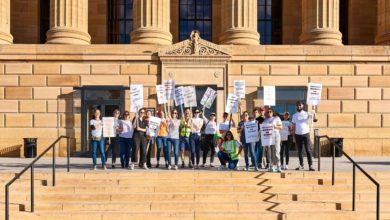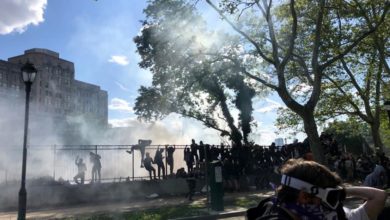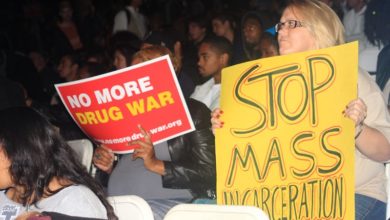The rulers of Philadelphia posture as the heirs of Quaker progressivism and tolerance, spinning a narrative about a city of “brotherly love” in a commonwealth whose constitution guarantees a “thorough and efficient system of public education.” In the same city, the superintendent of schools announced one month before the scheduled beginning of classes that the school year may not be able to begin on time for lack of adequate funding.
Public education in Philadelphia has been under varying levels of attack for years, but the current situation may be the most severe yet. Facing a $304 million budget shortfall, the School Reform Commission imposed a “doomsday budget” of shocking measures that gut public schools of their educational and social content. The SRC is an unelected body that has governed the city’s schools since 2001, when another crisis led state-level officials to take over the local education system instead of addressing the root causes of the district’s decline.
Under the doomsday budget, all librarian, guidance counselor, assistant principal, lunch and playground aide and secretary positions would be eliminated. Extracurricular clubs, music and art programs as well as athletics would also be totally cut. In June, 3,783 school employees got layoff notices.
On Aug. 8, in a stunning display of hypocrisy, Philadelphia School District Superintendent William Hite announced that because of the doomsday budget, which he drafted, schools would not be safe enough to resume classes in the fall unless the district immediately received $50 million in emergency funding. After extending a regressive sales tax, the city was eventually able to take out a loan to cover this amount, allowing for a skeleton staff to be rehired but keeping schools outrageously unprepared.
These devastating cuts come on the heels of the closure of 23 schools announced earlier this year. The closures were blatantly racist—while Black students compose 55 percent of the district, 79 percent of students whose schools were targeted are Black. The overwhelming majority of students in Philadelphia are Black or Latino, giving the doomsday budget a similarly racist character.
Familiar lies from ruling-class politicians
The ruling class narrative about these attacks on the right to an education is that Philadelphia is facing a shrinking tax base in a changing economy, forcing city leaders to make tough but necessary decisions so that the school district can live within its means. In reality, conscious political actions caused the impending disaster.
In 2011, Pennsylvania’s education budget was cut by about $1 billion. This had a disproportionate effect on Philadelphia, whose schools depend more on state aid than wealthier districts that rely more on municipal funding. There has also been an explosion in the number of charter schools operating in the city, a phenomenon that costs the school district $675 million in lost revenue.
Meanwhile, environmentally damaging gas drillers who exploit the state’s Marcellus Shale reserves pay no taxes, and since taking office in 2010, Pennsylvania Gov. Tom Corbett has presided over a $685 million expansion in the state prison system, including a new $400 million prison just outside of Philadelphia.
But instead of rearranging priorities to fund vital services like education, politicians are seeking to shift the burden onto working people. Both the governor’s Republican administration and the Democratic Party machine that has near-absolute control of Philadelphia’s local government agree that massive concessions by the teachers’ union and other school workers are a stipulation in any funding plan. Corbett has even gone so far as to say he will refuse to provide any state assistance in the crisis until the union agrees to extreme concessions.
Already, the SRC has approved the superintendent’s blatantly illegal request to suspend seniority rules and salary steps for teachers. In total, officials are seeking $130 million in givebacks from Philadelphia teachers, who are already paid 13 to 19 percent less than in surrounding, wealthier districts. The teachers’ contract expires at the end of August.
Privatization plans
At the heart of this crisis is the very existence of public education in Philadelphia. The increasing dominance of profit-oriented charter schools, a process orchestrated by the city’s political and economic elite, point towards plans for the ultimate privatization of the education system.
This was even articulated openly last year by the school district’s “Chief Recovery Officer” Thomas Knudsen. Under the “Knudsen Plan,” by 2017 the district would close 58 schools, and those that remained would be grouped into “achievement networks” and auctioned off. This move proved to be premature in the face of an outraged fightback by students, teachers, parents and community members, but the goal remains the same.
Similar situations can be seen in cities across the country, from Chicago to New Orleans to Washington, D.C. The national scope of this attack on public education, bankrolled by billionaires like Bill Gates and the Walton family, is based on a fundamental reassessment of the needs of the capitalist economy. Public education became the norm on a national level during the period of industrialization, when the capitalist class needed workers who were literate enough to do the more complex and technical tasks associated with the new, advanced means of production being introduced.
As the executive committee tasked with carrying out policies and pursuing strategies that are in the common interest of the capitalist class as a whole, the government took on the responsibility of providing this education. In the following decades, mass struggle defended and expanded this institution that poor and working people correctly viewed as a progressive step towards alleviating the ignorance imposed by the oppressive conditions of society.
The situation today is very different. Some 58 percent of jobs added during the current economic crisis are low-wage, paying between $7.69 and $13.83 an hour. The capitalist class does not need the increasingly large number of the workers engaged in low-skill, largely service-sector employment to have anything approaching a quality education. Privatizing schools turns them into a new source of income.
However, the people of Philadelphia and poor and working people in many other cities have refused to allow their future and the future of their children be dictated by the impulse to maximize profit. Corbett, Hite and the other architects of privatization in Philadelphia have had their schemes met with walkouts, marches, rallies and hunger strikes. The campaign to end public education will have to contend with the determination of poor and working people, which history has proven time and time again to have limitless potential.






